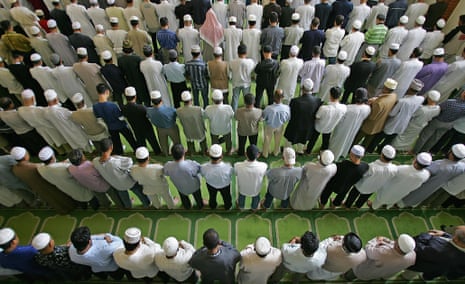A survey of 6,000 schoolchildren has found widespread misconceptions about the number of immigrants and non-white people living in England, as well as negative attitudes towards Muslims and those born overseas.
The study, believed to be the largest of its kind to be carried out in the UK, found that 60% of the children questioned believed it was true that “asylum seekers and immigrants are stealing our jobs”, while 35% agreed or partly agreed that “Muslims are taking over our country”.
The research was carried out by the charity Show Racism the Red Card (SRTRC) and based on questionnaires sent to more than 60 schools around the country from 2012 to 2014.
Ged Grebby, SRTRC’s chief executive, said the findings raised serious questions about the information young people were getting from the media and sharing online, and warned that more needed to be done to prevent them succumbing to far-right ideologies.
“We have found that there is a large amount of negativity when young people are asked questions about immigration or Muslims,” he said. “This survey shows that this is fuelled by a totally distorted view of the number of immigrants and Muslims living in the UK.”
The study of 5,945 children aged from 10 to 16 at schools across England found:
- The average estimate for the percentage of foreign-born people living in the UK was 47%. The true figure is 13%, according to the 2011 census.
- 28% believed jobs being taken by foreign workers might stop them reaching their goals, and 49% agreed that migration to the UK is out of control or not being managed properly.
- Nearly a third agreed with the statement “Muslims are taking over England”, while 41% disagreed, and on average respondents thought Muslims made up 36% of the population, as opposed to the true figure of around 5%. Almost half [47%] agreed there are poor relations between Muslims and non-Muslims in England.
- Many of those questioned were also pessimistic about their own futures, with more than a third – 35% – believing they would not achieve their potential at school, 40% stating they will not earn enough in the future, and 43% saying there is a lack of job opportunities.
Dr Paul Jackson from the University of Northampton, who worked on the research project with SRTRC, said: “There is clearly a gap between the reality and perception on issues like the number of immigrants or the size of the UK’s Muslim community among some young people. The subsequent levels of hostility towards these groups is very worrying and is something that we, as a society, need to take seriously.”
Prof Hilary Pilkington from the University of Manchester said that unless these perceptions are challenged, and young people are given more reason to be optimistic about their own futures, the political and social implications could be far reaching.
“This is not evidence of widespread racism among young people but it is clear there is a large degree of anxiety – often based on inaccurate information – about what is happening in their communities and about their own futures.”
Pilkington, who has written extensively on young people and the far right, said young people had been hit particularly hard in the downturn and it was very easy for valid economic concerns, over issues such as housing and jobs, to spill over into antipathy towards immigrant communities and foreigners.
“The political and educational challenge we now face is to find a way of constructively talking about culture, faith and immigration so that those who are most dispossessed can see the similarities of their precarious positions with those of marginalised ethnic or immigrant communities,” Pilkington said.
The study was based on questionnaires sent to 60 schools around England between 2012 and 2014, followed by visits from SRTRC. Although it is not a representative survey, the authors say in terms of the ethnic and religious breakdown of those questioned it is broadly in line with the census of 2011.
Grebby said that the attitudes in the survey mirrored the experience of his staff, who give talks and lessons in schools up and down the country every week. But he said there was evidence that these attitudes changed among young people who had attended SRTRC’s workshops.
Grebby said: “SRTRC’s educational model is built around the need to ensure young people have the critical thinking skills necessary to challenge inaccurate information and build resilience towards the adoption of potentially prejudicial attitudes. It is only once we acknowledge the existence of these attitudes and identify the influences at work that we can deliver the right kind of educational interventions to help build capacity to resist racist ideas and attitudes among young people.”





